Tips for spotting fake sourdough bread at the store so you don’t waste your money on a phony product that is an unhealthy choice.
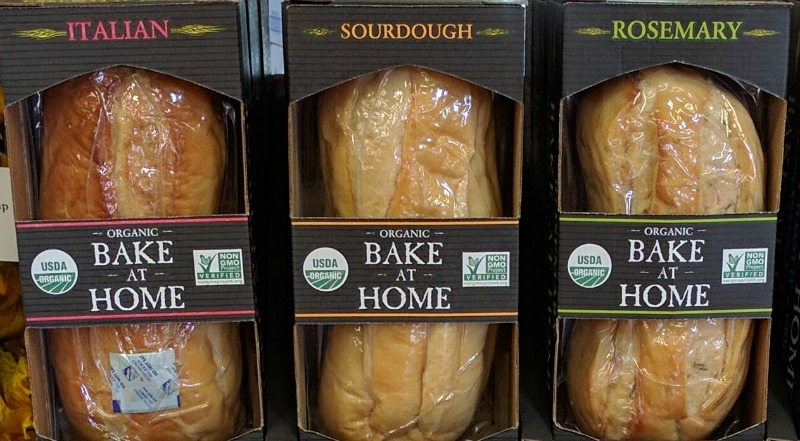
As awareness of the benefits of sourdough bread increases, so does the potential for food manufacturers – both large and small – to exploit the term.
And exploit it they most certainly do!
I recently examined every single loaf of bread at a local health food store. I found only one out of over half a dozen that claimed to be “sourdough” that was leavened in a traditional manner. No, it wasn’t The Essential Baking Company sourdough bread in the picture above. You won’t believe what this company is doing to fool consumers. Even I was shocked, and I thought I had seen it all.
If you choose to buy instead of making sourdough bread yourself (yes, it is a bit time-consuming!), then be on the lookout for fake sourdough!
It is literally everywhere!
Spotting phony sourdough is a more difficult process than you might think due in part to the sourdough myths that seem to abound.
When I first set out to write this article, I thought it would be fairly straightforward to explain. As it turns out, spotting a fake sourdough is rather tricky due to unethical food manufacturer tactics that are far sneakier and devious than I ever imagined.
You really need to be on your toes when sourcing sourdough bread to ensure that you aren’t wasting your money on a product you thought was a healthy choice for your family, but in fact, was quite the opposite.
If you use reading glasses, be sure to always bring a pair with you into the store so you can read the fine print on the packaging. If you wait until you get home to take a look, chances are you are going to be disappointed.
Fake Sourdough Masquerading as Real
The picture above shows one of the most popular fake sourdoughs on the market as of this writing. I was asked to take a look at it by a reader who thought it was legit. This brand is available at many health food stores. At my local Whole Foods, it is very prominently placed with an attractive display right near the checkout lines.
Some folks have notified me that it is also available at Sam’s Club and Walmart mega-supermarkets too!
Notice how the company has taken great care to appeal in every way to the health-conscious, time-challenged consumers:
- The loaf is clearly labeled “Sourdough”.
- The USDA Organic certification is front and center on the box.
- The NonGMO Verified label is prominently shown.
- The term “Bake at Home” is used to catch the eye of time-strapped consumers, some of whom WANT to provide fresh-baked sourdough for their family, but just don’t have the time.
I give this label a 10 out of 10. Fantastic marketing that is sure to move those boxes off the shelf like hotcakes. It’s even priced like a real sourdough would be at $6+/loaf where I live.
Watch Out for Ingredients Listed on the Box vs Online
Here’s the sneaky part. The ingredients on the label of this phony sourdough are DIFFERENT than what is on the website. Yes, the company has obviously done its research. Consumers are increasingly checking out products online before buying.
Don’t fall for this trick. Below is an online screengrab from December 28, 2016, of the ingredients for this company’s “sourdough” bread:
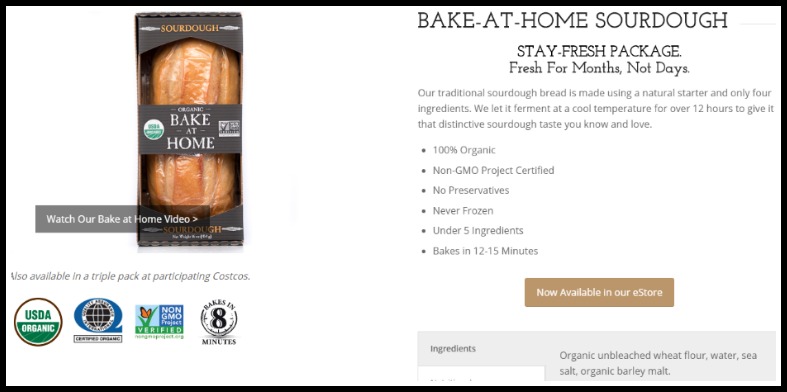
Notice the ingredients say: organic unbleached wheat flour, water, sea salt, organic barley malt.
To semi-researched consumers who know enough about sourdough bread to understand that it never contains yeast, this is enough information to fool them and get them to buy.
Take care not to be easily fooled, however! Look what I found when I looked at the actual label of this very same sourdough bread at the store. Check out the photo below taken on the very same date – December 28, 2016.
The exact same sourdough bread has YEAST listed on the box!
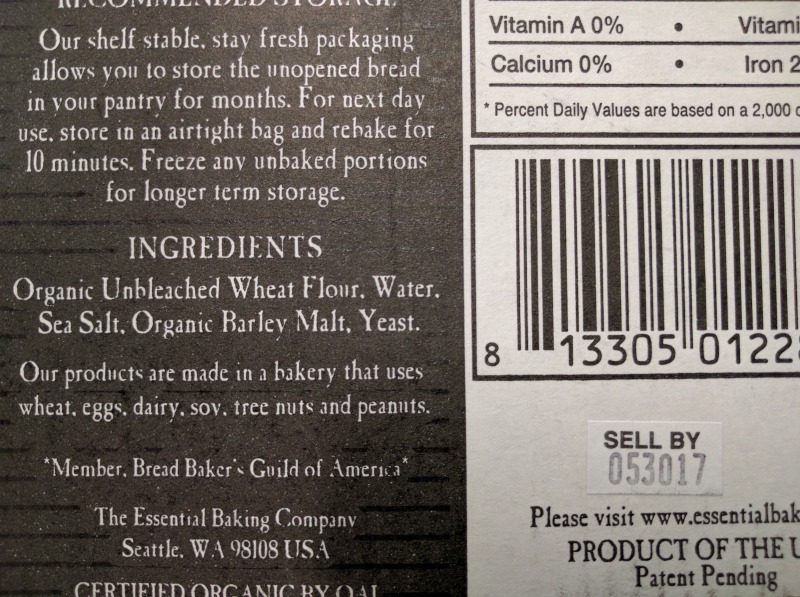
This is a new tactic I have not been aware of before … listing different ingredients for a product online versus what is on the label. Online it states “under five ingredients” using a “natural starter” with the bread “fermented” at a cool temperature for over 12 hours. The box at the store, however, lists 5 ingredients and the “natural starter” turns out to be yeast, which is most decidedly unnatural when it comes to sourdough! Other problems with this bread include the use of sweetener (organic barley malt) and white flour.
If a product seems too good to be true, it probably is.
I mean, seriously? Would an authentic sourdough come in a convenient “bake at home in 12-15 minutes” package that is shelf-stable for nearly 6 months?
Absolutely not!
The short video below summarizes the issues and how to spot the good stuff.
Authentic Labels
The label of true sourdough bread is going to list sourdough starter instead of yeast in the list of ingredients. For example, the gluten-free sourdough bread I buy from a local bakery has “cultured brown rice flour” listed as the starter.
The wording for the sourdough starter varies from brand to brand.
However, there will usually be some indication of a cultured starter as the leavening agent.
This starter contains natural beneficial yeasts from the environment rather than processed baker’s yeast which increases baking speed and baking temperature.
This is important because naturally leavened bread is more digestible, nutritious and less likely to trigger allergy problems than modern, yeast rise bread.
Ultimately, the consumer really must take the time to ensure that the sourdough bread of their choosing really is what it claims.
The Sourdough Bread I Buy
Real sourdough bread is so difficult to find that I’ve resorted to shipping freshly baked sourdough direct from the bakery to my door.
The bakery I use is Organic Bread of Heaven and I order the Rustic Sourdough. I ship in six loaves at a time and freeze what I won’t use in 4-5 days. They also have sourdough bagels, tortillas, hamburger buns, and English muffins among other authentic items.
Free shipping is available for orders over $49 (ask a friend to jump in with you!). The price is several dollars cheaper per loaf than the bread at the health food store.
To give it a try, use coupon HEALTHYHOME (all caps) for 10% off your first order.
Even if you pay shipping by ordering just a few real sourdough loaves, the price per loaf is still comparable to the fake sourdough at the health food store!
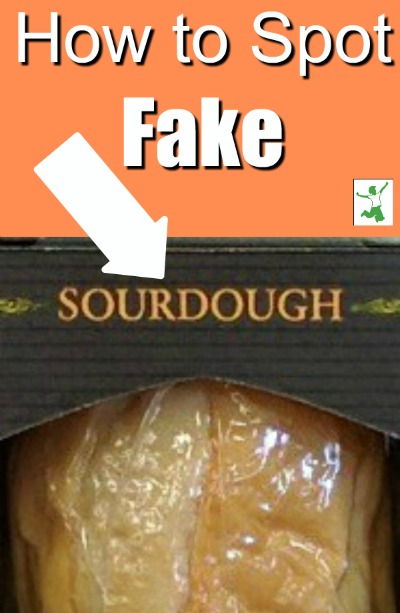
Rules of Thumb
Here are some rules of thumb to identify authentic sourdough bread:
- A handful of ingredients
- No yeast
- Cultured flour starter
- No sweetener
- Made using whole grain flour
- The dough ferments before baking for at least 4-6 hours
After examining the label, if you are still unsure, make a phone call or email to the company. Ask how long the sourdough is allowed to rise (double in size) before baking.
A true sourdough is going to rise for a minimum of about 4-6 hours and even as long as 10-15 hours depending on the temperature.
No baker’s yeast is needed. In addition, no sweetener should appear on the label.
Fake Sourdough At Panera
Be aware that Panera markets its sourdough as real when it is fake too.
Longtime reader Beth S. sent me this email from Panera customer support when she inquired about the authenticity of its sourdough bread. Beth gave her permission to reprint this email.
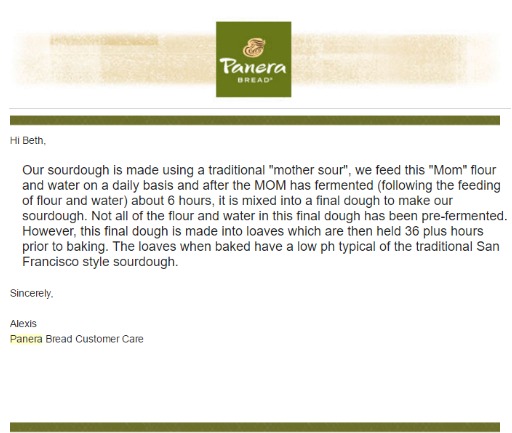
While this answer sounds promising, examining the ingredients of Panera Bread’s sourdough quickly identifies it as a fake. From the Panera website:
Unbleached Enriched Wheat Flour (Flour, Malted Barley Flour, Niacin, Reduced Iron, Thiamine Mononitrate, Riboflavin, [synthetic] Folic Acid), Water, Salt, Yeast (Yeast, Sorbitan Monostearate, Ascorbic Acid [GMO]), Dough Conditioner (Ascorbic Acid [GMO], Microcrystalline Cellulose [refined wood pulp], Corn Starch [GMO])
Not only is the Panera sourdough a phony, but it also contains yeast, wood pulp, and GMOs. It is also fortified with synthetic vitamins including dangerous folic acid (instead of natural folate).
At least The Essential Baking Company’s fake sourdough described earlier in this article is organic. This means no GMOs or other toxic ingredients.
As you can see, the phony sourdoughs on the market today range from simply misleading to downright dangerous. Best to avoid them all and get the real thing!
Do you currently buy an authentic sourdough? If so, what are the ingredients and what is the brand?








I was buying Whole Foods Sourdough bread that they make, because it had 4/5 ingredients and seemed to be a good source at the time. Long story short, I had to order my grocery order online and have it delivered. In the store their bread is not packaged and has a sign that is on the window of the 4/5 ingredients. When it was delivered.. it had a bar code on the bag with the typical sticker of ingredients and it mirrored the Panera ingredients you’ve listed in this post. I felt totally taken for- I was so happy to find sourdough without Folic Acid, etc. It doesn’t seem legal that they can do that.
Wow. I am thinking that what they “market” the bread to be online or via other methods (aka, in the store) can “vary” from what is legally required to be listed on the ingredients label. What a scam.
What brands are safe?
I would suggest getting a copy of the Weston Price Foundation’s Shopping Guide which lists bread brands that are what they claim.
I believe that Columbia River Sourdough passes the test.Thanks for this article. It looks like it is very easy to be deceived.
Wow, this is such BS! I have never seen this strategy either… And I somehow doubt it’s an honest mistake …
Very informative and surprising! I’ve been bamboozled! Thank you. Will look carefully at the sourdough products I purchase !
Oh good grief! Deception in every bite! Have my einkorn dough souring to bake tomorrow. Dough for crackers, too. Thanks for the warning
Thank you for exposing another food scam. Another product that isn’t what it seems to be is Panera’s sprouted grain rolls. Here’s the ingredient list I found on their website: Sprouted Grain Mix (Water, Wheat, Rye, Spelt, Oat Groats), Unbleached Enriched Wheat Flour (Flour, Malted Barley Flour, Niacin, Reduced Iron, Thiamine Mononitrate, Riboflavin, Folic Acid), Water, Whole Wheat Flour, Honey, Special Blend (Organic Wheat Sour, Whole Wheat Flour, Guar Gum, Defatted Soy Flour, Malted Barley Extract, Soy Lecithin, Microbial Enzyme, Wheat Gluten, Ascorbic Acid), Rolled Oats (May Contain Wheat), Vital Wheat Gluten, Salt, Yeast (Yeast, Sorbitan Monostearate, Ascorbic Acid), Dough Conditioner (Ascorbic Acid, Microcrystalline Cellulose, Corn Starch).
essentialbaking.com/breads/artisan-bread/fremont-white-sourdough-bread/
This is the one I used to buy. Yes, it does contain barley malt, but the amount of residual sugars is so low that there are no sugars listed on the label in the nutritional section. And, again, I always checked the label when I bought it in the store just to make sure they hadn’t changed the ingredients and added yeast.
I have never bought their “bake at home” loaves, but I do know that Essential Baking Co’s already baked organic sourdough bread doesn’t have yeast it in. I used to buy it from time to time (can’t any more because I’m gluten free), but I always checked the label for yeast in the ingredients. I will not buy sourdough bread if there is any yeast in it because I know that means it isn’t true sourdough. Trader Joe’s also sells an all organic sourdough bread that contains no yeast.
There is yeast listed right on the ingredients label! The photo of the label is in the post. I see where you may have gotten confused, the company conveniently leaves out “yeast” in the ingredients list on its website and writes up the process of making the bread like it’s genuine sourdough (when it’s not).
Great post, Sarah! I am one who loves sourdough bread but doesn’t make it at home. I get mine from a farm in PA, but when I don’t I am VERY tempted to buy what looks like genuine sourdough at Whole Foods. Thanks for dispelling myths and keeping us on our toes!